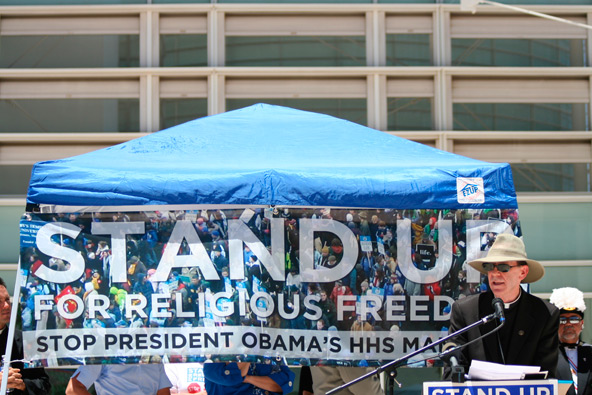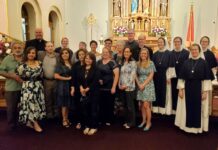
Notes from Bishop Thomas J. Olmsted’s June 23 homily at Ss. Simon and Jude Cathedral, marking the beginning of the local observance of the Fortnight for Freedom.
“Who do you say that I am?” Luke 9:20
The AD 2013 Fortnight for Freedom was officially launched on this past Friday evening in Baltimore, with a Holy Mass celebrated by Archbishop William Lori, at the historic Basilica of Our Lady of the Assumption, the first Catholic Cathedral in the United States. The Fortnight will continue for 14 days until the Fourth of July, our National Independence Day. As I have the honor of celebrating this Mass that is televised throughout our diocese and beyond, I invite you, indeed I urge you and your families, and particularly all those who are ill, elderly or homebound to take an active part in this Fortnight, especially through prayer. Do not remain on the sidelines while the rest of us take a stand for religious liberty. It is more important than ever not to be ashamed to be identified with Christ and His Church in this historic test of our faith.
There are those who say that participants in the Fortnight for Freedom are making a mountain out of a molehill, that some overly-zealous Catholics are turning a little quibble of conscience into a political sideshow, that what belongs in the privacy of the bedroom or should be confined within the walls of churches is being manipulated into a public show. Of course, these allegations are false. Similar things have been said of martyrs for the faith down through history, like the two saints whom the Church honored yesterday on the 22nd day of June: St. Thomas More and St. John Fisher.
In AD 1535, in England, all the bishops of that nation agreed to recognize Henry VIII as both the King of England and the head of the Catholic Church in England — all the bishops except for one: John Fisher, the Bishop of Rochester. At the same time, nearly all the public officials of England accepted Henry VIII’s outrageous claims — from the Lords and Ladies of royal families to lawyers and judges and other officials — except for one man who had been the closest confidante to the king: Thomas More.
These two men, one a bishop and one the highest ranking public official of the land, were mocked and reviled, imprisoned and subjected to humiliations and tortures of many sorts, before being eventually executed by beheading. However, nearly 500 years later, these two stand out as the great heroes of their time; and today are universally recognized as the persons largely responsible for the legal statutes that exist presently in England, America, Canada, Australia, and other nations in protection of the rights of conscience and recognition of religious liberty.
Three years ago, on Sept. 17, 2010, Pope Benedict XVI was welcomed at Westminster Hall in London, the very same hall where St. Thomas More had been condemned to death for refusing to recognize Henry VIII’s authority over the Church. Recalling that earlier event, our Holy Father spoke of “the dilemma which faced More in those difficult times”; one which he described as “the perennial question of the relationship between what is owed to Caesar and what is owed to God.” This perennial question is the one faced by you and me today in America. It is a question wrought with both temporal and eternal consequences. What is at stake, now as in England in AD 1535, is religious liberty, i.e. the question about our personal duty to be true to convictions based on faith and, simultaneously the duty of governments to respect these convictions. What we face is a test of our integrity, and an affront to our dignity as human persons. As we face these soul-searching confrontations, heroic martyrs like Sts. Thomas More and John Fisher help us to recognize our duty and mission from God. Their courage helps us to say with the great Old Testament saint by the name of Judith (Jud 8:25ff): “…we should be grateful to the Lord our God, for putting us to the test, as He did our forefathers. Recall how He dealt with Abraham, and how He tried Isaac, and all that happened to Jacob in Syrian Mesopotamia while he was tending the flocks of Laban, his mother’s brother. Not for vengeance did the Lord put them in the crucible to try their hearts, nor has He done so with us. It is by way of admonition that He chastises those who are close to Him.”
In today’s Gospel, Jesus poses a question that lies at the center of human existence, a question that, in the end, every human person will have to answer. Jesus says to Peter and the other Apostles, “Who do you say that I am?” Nothing in life is more important than our answer to this question. There is no other Name in the whole world by which we can be saved, no one else who can teach us to love, who can set us free from what is not love, and fill our hearts with faith and hope. In the end, each of us will have to answer this question. No one else can answer it for us. We cannot just report what others have said about Jesus; for He addresses the question to each one: “Who do you say that I am?”
In the Gospel account, notice that two answers were given to the question: one by Peter and the other by Jesus Himself. The answer by Peter gets to the heart of the matter for he recognizes Jesus as “the Christ of God,” the one anointed by God and through whom He will accomplish all that He has promised. Peter, however, even though his answer is inspired by God, still has an incomplete knowledge of what it means to call Jesus the Christ of God. There remains a grave danger that Peter will be tempted to fill out its meaning with his own earthly dreams of the Christ, dreams that easily could run astray. This is why Jesus directed Peter and the other Apostles not to tell anyone that He is the Christ.
More importantly, Jesus goes on at once to explain what it means for Him to be the “Christ of God.” He said, “The Son of Man must suffer greatly and be rejected by the elders, the chief priests, and the scribes, and be killed and on the third day and be raised.”
We cannot understand Jesus without the Cross. We cannot understand love or freedom without the Cross. For love finds its fullest expression in Jesus on the Cross. That is also the fullest expression of freedom, and the fullest revelation of the love of God.
Jesus’ death on the Cross was not something that was forced upon Him against His will. At any moment, Jesus could have ordered the angels to stop His crucifixion. But that would not have redeemed the world from sin and death. It would not have been an act of filial love. On the Cross, Jesus fulfills an act of perfect love by which He sets us free, reconciles us with the Father and restores freedom to the human race that we had lost by sin.
In order to be free, we must be freed by Christ by putting our faith and trust in Him. No one else can give us this freedom and no one can take it away.
Freedom, in other words, does not come from a government; it comes from God. A government, if it acts rightly, recognizes freedom as a gift of God and protects it against slavery and encroachment. A government acts wrongly when it coerces its citizens to violate their consciences or to pay a heavy price and penalty for faithfully following it. This is what is happening at the present time in America. The HHS mandate coerces Catholics and members of other religions to act against our most deeply held beliefs. This is a violation of the U.S. Constitution, federal and state laws, and our long American tradition of religious liberty. We cannot remain silent in the face of this grave injustice. To do so would be a betrayal of our duties as citizens and our God given heritage as members of the Body of Christ.
Some opponents claim that we Catholics are trying to force our beliefs on others. But that is simply false. It is in fact the government that is over-reaching its authority here; it is the government who is trying to force its beliefs on its citizens. We must resist such coercion. We cannot render to Caesar what is God’s. We must live the true freedom that we received through baptism into Jesus Christ.
Blessed Pope John Paul II said of St. Thomas More: “Thomas More witnessed the primacy of truth over power…He died as a martyr because of his passion for truth… for him his moral conscience was a defining voice, the voice of God in his soul.” This is the duty and the opportunity that the Lord Jesus is offering to you and to me today in America. With St. Thomas More and John Fisher and many other martyrs down through history, we have the honor to bear witness to the primacy of truth over power.
The threat to religious liberty in our country is indeed real and the consequences of the HHS mandates and other government coercions are severe. Nonetheless, let us trust that the Lord knows what He is doing, that, by allowing this evil for a time, He is offering us the honor and privilege of bearing witness to His Name at this time in history.
The greatest threat to our religious freedom, however, comes not from outside us but from within. True freedom has to be won anew, day after day, through God’s mercy, self-sacrifice and prayer. To be a loyal citizen, I must first be a faithful follower of Christ. I need to be a trustworthy servant of my country, but even more I need to excel in virtue and be a person of integrity. I need to live the truth in love, and keep Jesus at the center of my life. All else will be given us besides, if we seek first the Kingdom of God.





![[VIDEO] Make Sunday feel like Sunday again](https://www.catholicsun.org/wp-content/uploads/2021/04/2021-YOUTUBE-BISHOP-MESSAGE-THUMBNAIL-ENGLISH-218x150.png)